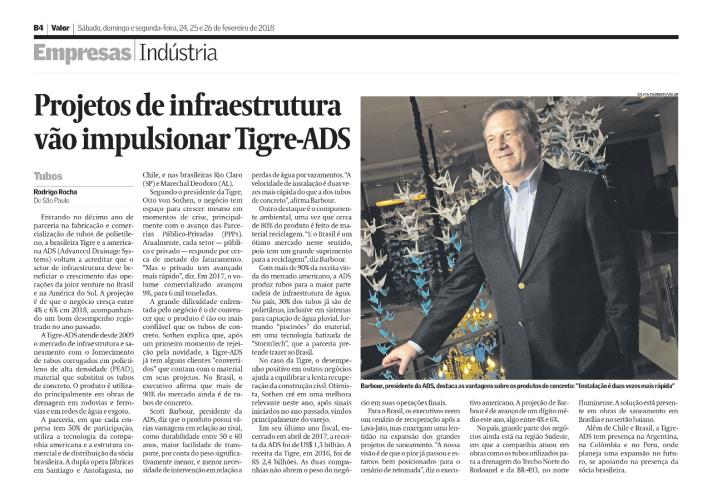The main daily economy and business newspaper in the country published a report on the perspectives of the HDPE pipe manufacturer for the infrastructure segment
The infrastructure sector should benefit from the growth of the operations of the Tigre joint venture and the American ADS (Advanced Drainage Systems) in Brazil and South America, where business should grow in the order of 4% and 6%. The estimate is by the president of ADS, Scott Barbour, in an exclusive interview with Valor Econômico. In the report published in Monday’s edition (2/26), Tigre’s president, Otto von Sothen, in turn, says that Tigre-ADS’s challenge is to convince that the product (HDPE corrugated tubes) is as or more reliable than concrete ones.
Follow the main infrastructure projects that will boost Tigre-ADS
excerpts from the report:
Tigre-ADS has been serving the infrastructure and sanitation market since 2009 with the supply of corrugated tubes in high density polyethylene (PEAD), a material that replaces concrete tubes. The product is mainly used in drainage works on highways and railways and in water and sewage networks.
The partnership, in which each company has a 50% stake, uses the technology of the American company and the commercial and distribution structure of the Brazilian partner. The duo operates factories in Santiago and Antofagasta, in Chile, and in Brazil’s Rio Claro (SP) and Marechal Deodoro (AL).
The business has room to grow even in times of crisis, mainly with the advancement of Public-Private Partnerships (PPPs). Currently, each sector – public and private – accounts for about half of the turnover. “But the private sector has moved faster,” he says. In 2017, the volume sold increased 9%, to 6 thousand tons.
The great difficulty faced by the business is to convince that the product is as or more reliable than the concrete pipes. Sothen explains that, after a first moment of rejection for the novelty, Tigre-ADS already has some “converted” customers that rely on the material in their projects. In Brazil, the executive says that more than 90% of the market is still made of concrete pipes.
Scott Barbour, president of ADS, says that the product has several advantages over its rival, such as durability between 50 and 60 years, easier transportation, due to significantly less weight, and less need for intervention in relation to water losses leaks. “The installation speed is twice as fast as that of concrete pipes.”
For Brazil, the executives see a scenario of recovery after the car wash, but they see a slowness in the expansion of major sanitation projects. “Our view is that the worst is over and we are well positioned for the recovery scenario,” says the American executive. Barbour’s projection is to advance by an average digit this year, somewhere between 4% and 6%.
In the country, a large part of the business is still in the Southeast region, in which the company worked on works such as the pipes used for the drainage of the North Stretch of the Rodoanel and BR-493, in the north of the state. The solution is present in sanitation works in Brasília and in the Bahian hinterland.

 Argentina
Argentina Chile
Chile Colômbia
Colômbia Peru
Peru

